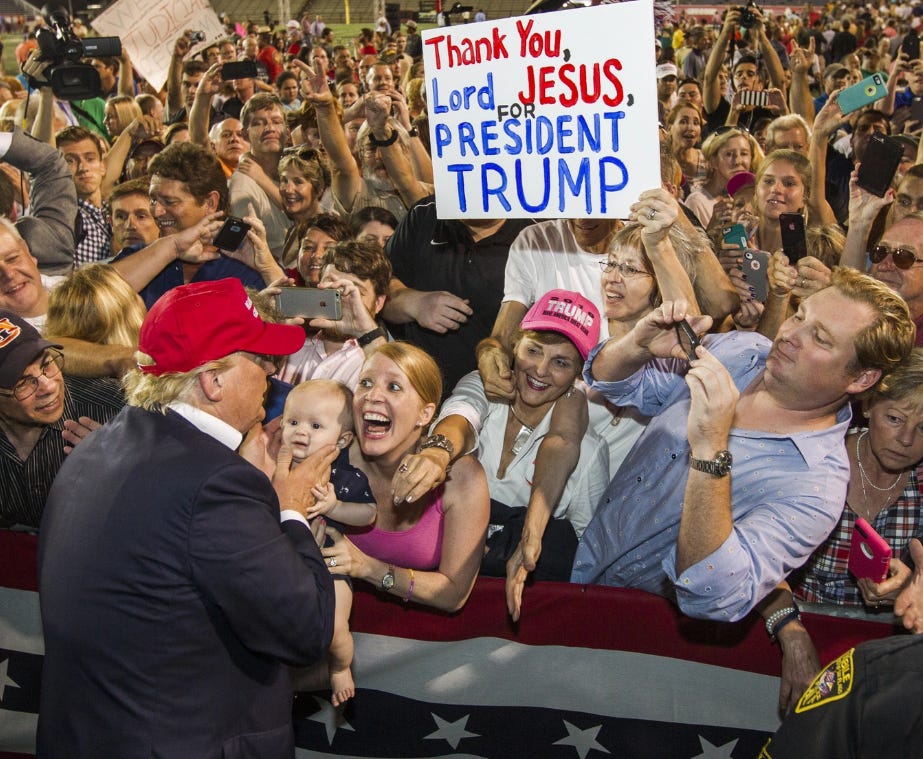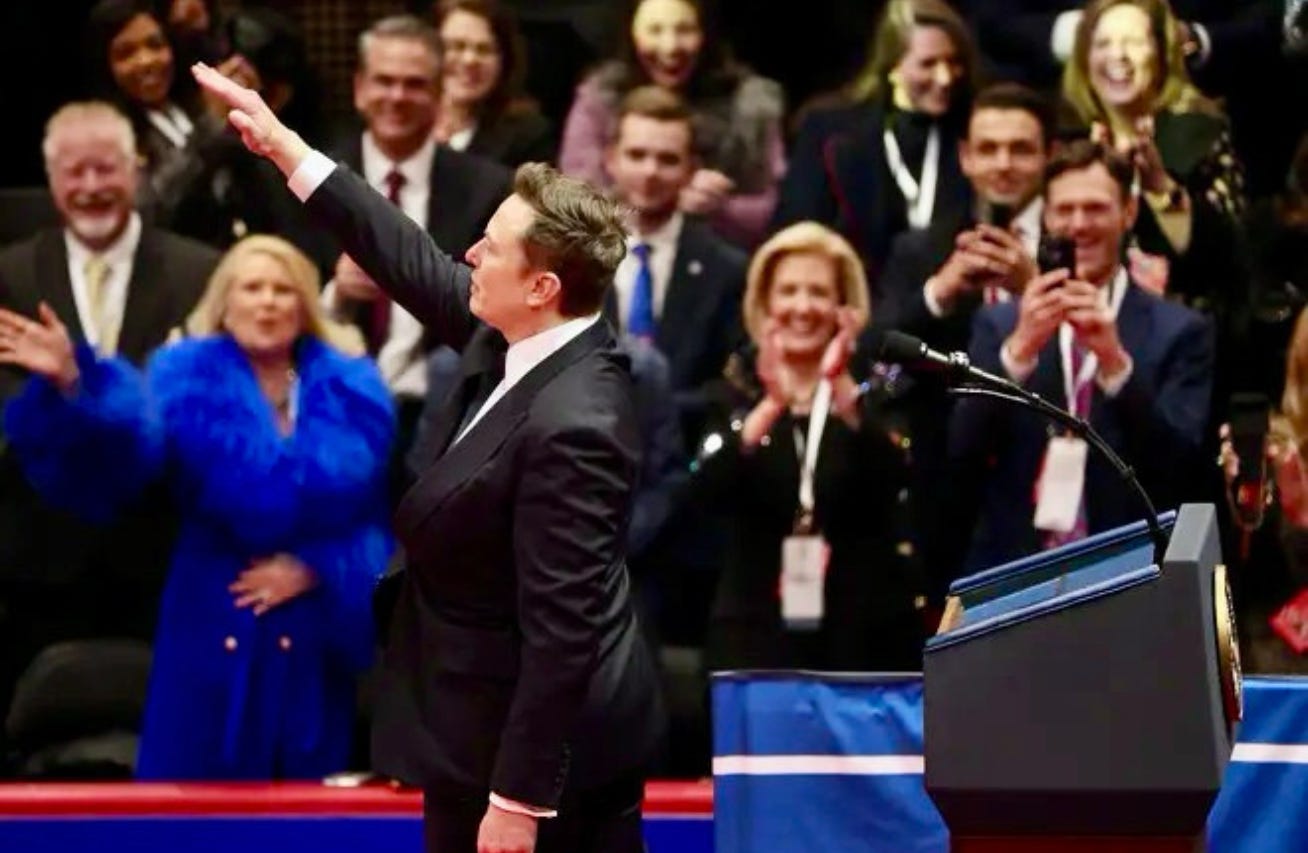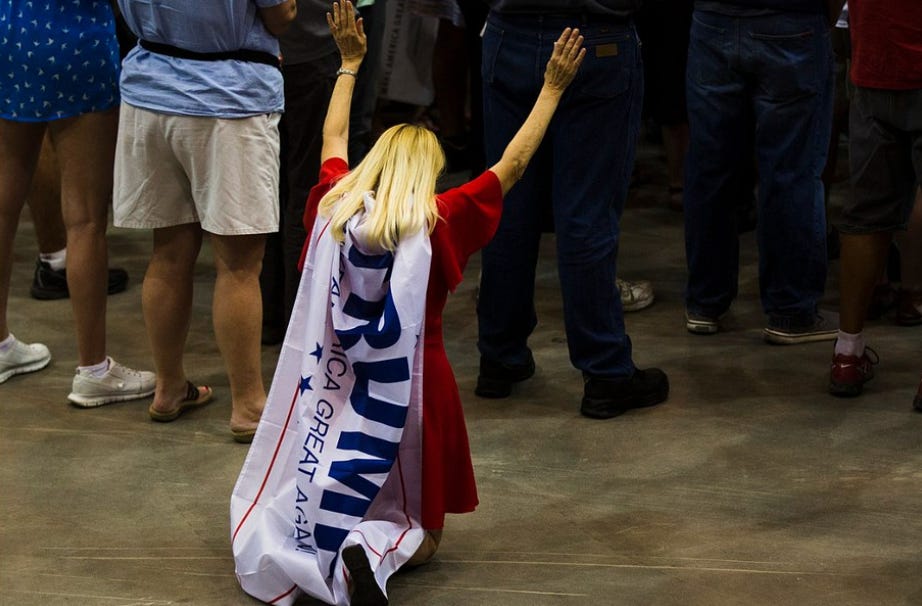MAGA applies "I'm rubber, you're glue" test
Even so-called progressives are calling the Democratic Party a cult, when MAGA's the only game in town

For the last few weeks, I’ve heard a growing chorus of people allege, in the face of substantial evidence to the contrary, that Democrats are in a cult. This, despite the fact that we see at the same time Donald Trump reclaim the Oval Office, riding the wave of MAGA support like a lead singer bodysurfing a crowd.
It’s projection. But it’s vital we correct the record and stomp this rumor before it catches hold and takes on a life of its own.
Prominent voices on the right have been spreading this rumor,1 and I’ve seen it expressed by everyday people — partisans — griping in comment sections about the oppositional party. But I’ve also seen at least one person nominally on the left, Cenk Uygur of the Young Turks, bandy this claim about.2
Uygur made the accusation in a recent interview with Brian Tyler Cohen, going further than he had even in this last month of escalating criticism about the Democratic Party.
“They [the Republicans] had a real primary, and Trump crushed them. We did not have a real primary. All we had was a bunch of jackasses who went and [said], ‘How dare you oppose Biden?’ to me, to Marianne Williamson [and] to Dean Phillips, a sitting US Congressman. They were like, ‘He is being disloyal! Joe Biden is great! Joe Biden is young and dynamic!’ You tell me that’s not a bubble, brother.3
“What I’m trying to explain to both sides is you’re both in bubbles! Please, for God’s sake, think objectively. And this is the #1 request I would have of people on our side, which is focus on policy. Don’t get into this cult of personality — ‘That’s a Democratic leader!’ — or cult of personality — ‘That’s Trump! We have to oppose everything that Trump is doing!’”
What Uygur is doing here is dangerous, because it fuels misconceptions in the very people who likely are in the MAGA cult themselves. Permitting them even a rhetorical perch allows them to point fingers and to maintain a self-deception about the nature of their own insular, polarized, reactionary group.
First and foremost, we can tell Democrats are not in a cult because the party has no leader. Yes, Democrats have a leadership structure — it has caucuses, members chair committees, etc. — but that’s the nature of a political party, generally speaking. The mere fact of the existence of a leadership structure does not a cult make.
On the other side, however, you have Donald Trump in full control of the GOP, not just as the standard bearer of his party but as the charismatic leader of a social movement. Surrounding Trump? A bona fide cult of personality.
While not all cults of personality are cults in the organizational sense — Taylor Swift fans, arguably, could constitute a cultish fan group — it’s the dynamic between Trump and his underlings that reveal the cultic structure. Trump is zealous, vindictive, solicitous of loyalty. He is wrathful toward those who rebuff him even while he demands adulation from his followers. A sizable contingent of his followers consider him a messiah, either secular (in the nationalistic sense) or divine; and Trump himself has played upon such ideas, asserting that he is “the chosen one.”
Nothing like that exists on the Democratic side of the aisle.
Another thing that Cenk Uygur has begun saying regularly but in which he is utterly wrong is the idea that because Democrats may be “in a bubble,” that means that 1) they’re in a cult, 2) the bubble that Republicans find themselves therefore isn’t so bad, or 3) both. The only way Uygur can come to these conclusions is to assert a false equivalence. He’s reducing each group down to one aspect; then, declaring that aspect the same in kind, equates the two, neglecting the difference in magnitude.
Along with this tendency to reduce, Uygur equates a symptom or an indicator of a cult and substitutes that symptom as being indicative of a cult in its totality. For example, he points to the fact that, when he began criticizing Democratic leadership, he ran into a wall of concerted opposition from supporters of the party, and he takes this as evidence of conformity run amok.
While I grant that there may be an element in some part of the party’s rank and file, and even among the grassroots, to fall in line — the height of this behavior coming as then-President Biden became endangered following his cataclysmic debate — such conformity did not extend to the party as a whole. Clearly not, as there ensued vigorous debate, leading indeed to Biden vacating the field of competition (a result Uygur himself lauded). So it is not as though the whole party was riven by the need for conformity.4
Uygur is also disingenuous in his portrayal of this trait of conformity as being proof that a cult exists. That’s obviously wrong on its face. We see conformity in a wide range of settings and circumstances. Bank tellers, for example, are trained to upsell financial products to customers, and it’s imperative to their respective institutions that they execute that script in every encounter. People in skilled trades are taught the standards of their fields, because adherence to the standards is what constitutes the skill. And in certain academies, students may be required to wear a uniform.
The existence of these codes of conduct or dress does not mean that the tellers, tradesfolk, and students are in cults. Uygur is making the classic logical error of reducing then extrapolating, as well as mistaking a part for the whole. While cults may implement conformity, not all instances of conformity are evidence of a cult.
Contrast the behavior of Democrats to the MAGA GOP, however, and the differences readily reveal themselves. In the very leadership structure of the GOP, elected officials do not contradict former (and now returning) president Donald Trump. One could say that they cannot — they would face some sort of retribution. Famously, former Arizona Representative Liz Cheney critiqued Trump in the wake of the January 6 attack on the Capitol, and for her efforts to hold her fellow Republicans to a higher standard she was hounded out of the party. (Former Illinois Representative Adam Kinzinger was similarly jettisoned from the party.)
On a more grassroots level, MAGA members display enormous levels of conformity. Trump’s supremacy is central to group membership: questioning Trump on just about anything is cause for ostracization. Holders of heretical beliefs are not tolerated but are isolated and chased off.
This high degree of dogmatism and submission is what reflects the power relationships as they manifest in MAGA, both vertically and horizontally. These power dynamics are what indicate that we have a cult on our hands.
It’s rich, also, to hear Uygur go on about this supposed epidemic of conformity in the Democratic Party, when it is liberals and Democrats who are notorious for their nonconformity. Corralling Democrats on an issue has been likened to herding cats. Will Rogers once quipped that he wasn’t a member of an organized political party — he was a Democrat.
It is the Democrats who proclaim that diversity is our strength. That’s not the ethos of a party that prizes conformity as a value. Rather, nonconformity and free inquiry are esteemed. Where there is nonconformity, there is intellectual freedom — the opposite of Cenk Uygur’s accusation.
That the GOP was metamorphosing into a cult was disguised for a long time, precisely because the organizational structure of the party obscured the dynamics that were coming to dominate. Now, that dynamic is known. Yet critics want to turn this observation on its head and attempt to apply it to Democrats, saying that the Democrats are as much a cult as Republicans. Why? Simply by virtue of being an organization? Is this an exercise in bothsiderism?
Although the Democrats and Republicans are the two main parties in our two-party system, that doesn’t mean that they’re equivalent or that the structure present in the GOP, which plainly permits for cultic dynamics to invade and take root, is at all similar to the structure underlying its opposition. Just as two individuals with different constitutions may encounter the same pathogen, one may become quite ill while the other shrugs the bug off. Or a farmer may sow the same strain of seed in two separate fields, but it’s the one with the most hospitable soil where the sprouts will flourish.
Simply because the two entities are both political parties does not mean they are equally susceptible to becoming political cults. It has happened on the GOP MAGA side of the aisle, with nothing even remotely resembling that on the Democratic side.
The GOP is mired in cult behavior — witness the tranche of conservatives and far-rightists today turning out to excuse a Nazi salute given by Elon Musk at Donald Trump’s inauguration.

One would be hard-pressed to come up with an explanation for such abominable behavior outside of those people being co-opted by a cult.
It’s critical that we mark these clear departure points, because bad actors like Cenk Uygur, Glenn Beck and others threaten to throw sand in our eyes so that we can’t tell anything apart. It’s clear that one of these things is not like the other.
Glenn Beck recorded a segment for his YouTube channel, titled “How to De-Program Your Friends from the Anti-Trump Cult.” Steven Hassan, a cult expert with his own YouTube channel, responded to Beck’s claim, as Beck utilized Hassan’s paradigm of influence to press the point.
Another person who recently had identified as Democrat but who has moved into the Republican column is influencer and booster Lindy Li, who was visibly active for the Kamala Harris campaign. After suffering backlash for going on conservative shows to backbite the campaign, Li now says, “My real friends are all supportive, but my political friends, it’s just been really bad. It’s a cult. The way that they’ve treated me is difficult.” Charles Spiering, “I was fully indoctrinated into the Democrat ‘cult.’ Here's why I left my liberal influencer life behind to raise money for Trump,” Daily Mail, January 14, 2025.
Uygur here is confusing two different terms. As C. Thi Nguyen summarized in the abstract in his paper “Echo Chambers and Epistemic Bubbles” (Episteme, 2018):
“An epistemic bubble is a social epistemic structure in which other relevant voices have been left out, perhaps accidentally. An echo chamber is a social epistemic structure from which other relevant voices have been actively excluded and discredited. Members of epistemic bubbles lack exposure to relevant information and arguments. Members of echo chambers, on the other hand, have been brought to systematically distrust all outside sources. In epistemic bubbles, other voices are not heard; in echo chambers, other voices are actively undermined. It is crucial to keep these phenomena distinct. First, echo chambers can explain the post-truth phenomena in a way that epistemic bubbles cannot. Second, each type of structure requires a distinct intervention. Mere exposure to evidence can shatter an epistemic bubble, but may actually reinforce an echo chamber. Finally, echo chambers are much harder to escape. Once in their grip, an agent may act with epistemic virtue, but social context will pervert those actions. Escape from an echo chamber may require a radical rebooting of one’s belief system.”
MAGA is in an echo chamber: members have been taught to view all other sources with suspicion, and, when confronted with evidence that contradicts their ideas, they tend to dig in their heels.
Truly: if the Democrats were in such lockstep, how did the Uncommitted movement even come to be? Uygur — more often than should make him comfortable — omits salient, disconfirming facts. This leaves the audience with a distorted view.







But, Novapsyche, the Democrats are rather cult-like in their lockstep support for genocide. Then there was Russiagate. In both cases, the party refused to take any responsibility for their loss. It’s quite clear that her support for genocide is what lost Harris the election. Has she admitted this? Have any of her handlers?
And Hillary Clinton and her followers are still blaming Russia for her loss, rather than looking to her own missteps. Maybe it’s not a cult—and I agree with you that the Trumpers are a cult. But it’s a distressingly immature mindset.